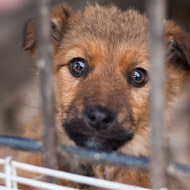Dog trafficking “will not be tolerated,” minister warns

More than 700 vehicles were checked by DEARA’s portal inspectors and council animal welfare officers.
Northern Ireland’s agriculture minister, Michelle Mcllveen, has warned that illegal movements of dogs through the country’s ports “will not be tolerated”.
Her call follows an operation between the Department of Agriculture (DAERA), Mid and East Antrim Borough Council and Belfast City Council, which led to over 30 puppies being prevented from travelling to Great Britain illegally.
“This sends out a clear message that enforcement bodies will take whatever action necessary to ensure that the welfare of animals is protected, that illegal movement will not be tolerated and that legislative requirements are met,” she said.
Launched before Christmas, the operation at Larne and Belfast Ports came after concerns were raised about the potential illegal movements of commercial consignments of dogs.
The initiative focussed on the welfare of animals during transportation, the identification of animals and the licensing and registration of dog breeding establishments.
In total, more than 700 vehicles were checked by DEARA’s portal inspectors and council animal welfare officers. This resulted in more than 30 pups being either prevented from travelling or surrendered at the ports.
Miss Mcllveen said that information gathered by her team will be shared with enforcement bodies in Great Britain and the Republic of Ireland to provide ongoing intelligence and to tackle the illegal trade in puppies.
“Legislation alone will not stop illegal puppy farming. This will take a concerted effort by members of the public and enforcement agencies working together to identify breeders who put financial gain before the welfare needs of their dogs and pups,” she said.
“I would encourage anyone with specific evidence of an illegal breeding establishment to provide this to councils to allow enforcement action to be taken.”



 The latest
The latest